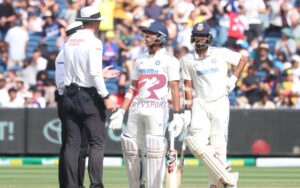
‘Intent’ used to be the most mentioned word in Indian cricket not long ago. It was spoken of frequently in press conferences. It seemed that the team was using it to convey that they would play an aggressive brand of cricket and be prepared to take risks. The attitude paid dividends. Although not relying on it completely all the time, India came close to winning the World Test Championship.
As fortunes take a dip, in a phase of transition under a new coaching team, amid uncertainty over the red-ball future of some stalwarts, the word intent is not heard that often. But make no mistake, Indians show a lot of it. There were many occasions in Australia when they tried to go against the tide and took the opposition on in tough conditions for batting.
The problem came when impulse got the better of intent. It’s a thin line between the two. Impulse makes one do things out of a sudden urge. There is no reason behind such acts. They are not planned and don’t follow a process. That’s why these can be counterproductive on difficult pitches. And, when a succession of these ventures end in failures, the result is what India got.
For the Latest Sports News: Click Here

Yashasvi Jaiswal, Shubman Gill, Rishabh Pant and seniors like Virat Kohli, Rohit Sharma and KL Rahul, all of them from time to time got dismissed trying something that was against the nature of things. Barring Jaiswal to an extent, none of the newer generation are newcomers. Such acts of indiscretion meant India could not seize the moments after working hard to reach promising positions.
The bowling unit fared better, but when it came to the crunch in the last Test in Sydney, something prompted the team management to resort to a short-length plan with two fielders placed deep behind square-leg. At least 25 of the 30 wickets to have fallen until then were claimed by deliveries pitched outside the off-stump. Mohammed Siraj and Prasidh Krishna made a mess of it and India’s fading chances evaporated quickly.
Along with transition, this is something that the Indian cricket establishment will have to address. It’s important to stay positive in the face of adversity and not let the circumstances get the better of the players. They had to pounce on the handful of opportunities provided by an opposition which hardly gave anything away. But, at crucial junctures of the Border-Gavaskar Trophy, impulse took over.

Going ahead and looking at the next Test assignment in England, this can be a problem. The youngsters have learnt aggression and the importance of showing it within permissible limits from the generation they are taking over from. They sometimes overlook that the bunch they are succeeding also knew how to use belligerence with discretion.
Although this is something that individuals have to master and the signal has to come from within, the coaching staff have a role to play. Players will have to be spoken to and not everyone will understand the same language. They have to be counselled individually if need be and taught that unless they add this to their game, they will always be found wanting in unfamiliar conditions.
Australia is a wake-up call in many respects. The start of a process of phase-out, looking for replacements in the spin department and reinforcements in pace bowling — there are lots on the plate of the board, selectors and the team management. Offering lessons in restraint is a tricky add-on for those who will navigate the team and the set-up in the next WTC cycle.
Also Read: Covering Olympics versus Cricket: Contrasting Journeys of a Sports Journalist




